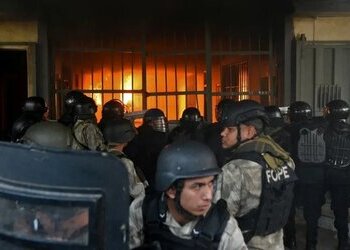By taking control of Paraguay’s largest prison, the Rotela Clan flexed its muscles.
The siege of the Tacumbú prison, which began October 10, ended less than 24 hours later when the prisoners leading the riot released its captives, which included at least 10 guards and 30 female visitors hostage, according to a Justice Ministry press release. Local media reported the director of the prison, Luis Esquivel, was also among the hostages, though the Justice Ministry did not mention him in its release.
In an October 11 press conference, President Santiago Peña denied that the takeover of Tacumbú was a crisis, claiming instead that it’s part of “a confrontation with crime that the state is facing morning, noon, and night.”
SEE ALSO: DataInSights: Are Pretrial Detentions Fueling Organized Crime in Paraguay?
The hostage situation followed accusations made by Paraguay’s Justice Minister Ángel Barchini against the Rotela Clan, a powerful drug trafficking organization that appeared to be behind the riot in Tacumbú, Paraguay’s largest prison.
In an October 2 meeting of President Santiago Peña and his cabinet that was broadcast throughout the country, Barchini claimed the group was responsible for kidnapping and murdering Óliver Lezcano, a former police officer incarcerated at Tacumbú who had disappeared from the prison on September 27. The minister also announced his intentions to wrest control of Paraguay’s prisons from the Rotela Clan and other criminal groups in the country.
The Rotela Clan rejected Barchini’s accusations, claiming that the officer was not dead and had in fact escaped, El País reported.
On October 10, Rodrigo Nicora, Paraguay’s Vice Minister of Criminal Policy, also contradicted Barchini’s claims on a local radio station, noting that sources of intelligence suggested the former police officer escaped from the prison. That same day, the prisoner’s families released a video in which a man claiming to be Lezano says he is not dead. The authenticity of the video has yet to be confirmed.
InSight Crime Analysis
The takeover of Tacumbú seems to mark a resurgence of the Rotela Clan.
Paraguay’s prisons have been battlegrounds between the Rotela Clan and its main rival, the Brazilian First Capital Command (Primeiro Comando da Capital – PCC), and for a while, it appeared the PCC might be gaining the upper hand. In 2019, InSight Crime reported that both groups were present inside Tacumbú, but that the PCC was exerting increasing control inside the penitentiary system writ large.
However, local media reports and expert accounts point to Rotela’s Clan power in the prison.
SEE ALSO: Prosecutors, Mayors and Prison Directors – Paraguay’s Frightening Assassination Problem
“They are the majority in Tacumbú, and they have agreements and pacts with the people who run Tacumbú,” said Jorge Rolón Luna, a security expert and former director of the Observatory on Citizen Security at the Paraguayan Interior Ministry, referring to the Rotela Clan.
Not originally a prison gang, the Rotela Clan controlled much of the crack sales within Paraguay before the arrest of one of its main leaders, Armando Javier Rotela, in 2016. They have since expanded within the prisons, building drug trafficking networks worth millions while frequently clashing with the PCC.
The takeover of Tacumbú comes amid this progressive accumulation of influence in the penitentiary system, criminologist Juan Martens told InSight Crime.
“It is a demonstration of power showing who really governs in the case of Tacumbú,” Martens added.
This rise has been aided by extreme overcrowding, caused by abuse of pretrial detention. Poor conditions in the prisons push more incarcerated people towards the group as they look for protection.
The threat the group poses to government officials who have threatened to crack down on the prison in the past also allows the group to expand with impunity. In 2022, a former director of Tacumbú who had initiated police operations within the prison reportedly received threats from Clan Rotela before he was murdered. Then, in August this year, hitmen attempted to assassinate another former director of the prison. The Clan Rotela was suspected of being behind the attack.
While intimidation limits the government’s ability to prevent the Rotela Clan’s expansion, corruption at the highest levels plays a significant role and political will is necessary for change, Rolón told InSight Crime.
“The ladder is swept from the top down, not the bottom up” he said.

